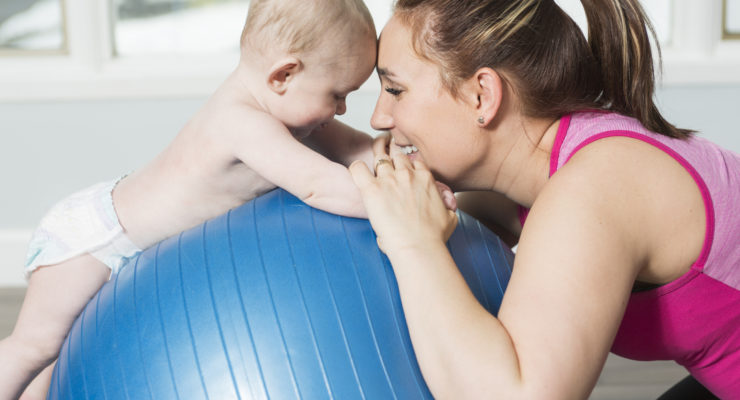5 Tips to Lose the Baby Weight for Good
Article posted in: Diet & Nutrition
When you’re expecting, everyone comments on how adorable you look. Then your bundle of joy arrives and the pressure of losing baby weight sets in before you’re even wheeled out of the delivery room.
Every day we see magazine covers and social media images of svelte, bikini-clad celebrities showing off their rock-hard abs just days after delivery. This can leave you feeling like you should be strutting out of the hospital in your skinny jeans, erasing all evidence of the remarkable, nearly year-long transformation your body underwent.
It’s important to remember that if you didn’t gain the weight overnight, you can’t expect to lose it that fast. In fact, according to MedlinePlus.gov, you should plan to return to your pre-pregnancy weight about six to 12 months after delivery. Why so long? The Mayo Clinic indicates that you can expect to lose about 13 pounds during childbirth. However, the American Pregnancy Association recommends that most women gain more than that when pregnant.
Here’s a breakdown of their pregnancy weight gain recommendations:
- 25-35 pounds if you were a healthy weight before pregnancy (BMI of 18.5-24.9).
- 28-40 pounds if you were underweight before pregnancy (BMI of less than 18.5).
- 15-25 pounds if you were overweight before pregnancy (BMI of 25-29.9).
- 11-20 pounds if you were obese before pregnancy (BMI over 30).
According to the Centers for Disease Control and Prevention (CDC), data reveals that nearly half of all pregnant women gain more weight than is recommended. It’s no wonder it can take a while to shed the baby weight. The good news is that losing baby weight isn’t impossible. Sure, it might feel that way when you’re in survival mode adapting to life as a new mom. However, you can start losing the baby weight if you follow a few simple guidelines.
The important thing to remember is that slow and steady is the best approach. According to Medlineplus.gov, it’s recommended to wait six to eight weeks before actively trying to lose weight. This allows your body time to recover and to establish a stable milk supply if you are breastfeeding. After that, strive for a weight loss of about a pound to a pound and a half per week. This is a rate that is both achievable and sustainable long-term. As always, speak with your doctor before starting a weight loss program to ensure it fits your specific needs.
Here are five tips to help you with losing baby weight for good:
1. Make it Easier to Eat Healthy

If you want to lose the baby weight while staying healthy and strong for your little one, you must eat a nutrient-rich and well balanced diet. That’s easier said than done when you’re tending to a newborn 24/7. In the first few months after having a baby, getting to the grocery store and cooking a healthy homemade meal can feel like a distant dream.
If going food shopping is impossible, it’s a great task to give a friend or family member who has been asking how they can help. Send them to the supermarket with a list of healthy, prep-free snacks like veggies and hummus, berries and string cheese or English muffins and avocados. Find a few simple slow cooker recipes that can be tossed in the crockpot and forgotten about until mealtime. The leftovers will be a lifesaver on days that you’re too busy caring for your baby to worry about assembling a meal.
Make it even easier on yourself by considering a meal delivery service that will send healthy meals to your home. This will mean no shopping or cooking is necessary. Nutrisystem programs are a great option because you’ll get healthier meals and snacks that are portioned for weight loss right to your door. Make sure to connect with our Weight Loss Coaching Team if you’re breastfeeding for the right meal plan for you. It’s convenient and will help you lose the baby weight, a win-win.
2. Move More

Once you’ve got the diet down, consider squeezing in some physical activity each day. Easier said than done with a needy newborn, we know. However, if you make a daily stroller walk a part of your routine, you can burn calories with your little one in tow. Other options? Pull up a workout video on your computer or TV that you can do while the baby naps. Try to join a “Mommy and Me” workout class near you. We also have some easy ideas for working out when you’re busy with your baby. Check them out here! >
3. Track Your Calories

A new study out of Duke University shows that people who track what they eat via a Smartphone app have great success at weight loss. Download the Nutrisystem app and digitally record your daily intake! It’s a great way to hold yourself accountable and will help you get a realistic picture of how much you’re eating.
Keep in mind that if you’re exclusively breastfeeding, you’ll need to eat more than you did before you became pregnant. Your body needs about 300 to 500 extra calories each day says the American Pregnancy Association. Talk to your doctor before you start cutting calories to ensure you do so without compromising your milk supply.
4. Don’t Pick

A handful of crackers here, a scoop of ice cream there—the calories can really add up. When you’re constantly tending to someone else’s needs, it can be much easier to pick all day instead of eating real meals. Those sneaky calories can pile up fast and make losing baby weight difficult. Try your best to keep mealtimes intact, even if that means you need to change them up to coincide with nap-time.
It’s also important to make sure you’re only eating when you’re hungry, not because you’re exhausted, bored or feel like you deserve a treat. If you find yourself heading to the pantry for a snack between meals, ask yourself if you’re eating out of hunger or another reason. Boredom, loneliness, stress or exhaustion can all lead to grazing. Not sure if you’re actually hungry? Click here to find out. >
5. Breastfeed

The decision of whether or not to breastfeed is a personal one. There are plenty of reasons women decide against it. If you do decide to breastfeed, the Academy of Nutrition and Dietetics indicates that it can burn up to 500 calories per day and ultimately lead to weight loss in many women.
A study in the American Journal of Clinical Nutrition found that breastfeeding helped women return to their pre-pregnancy weight by six months postpartum. Another study in the International Journal of Obesity (that included nearly 750,000 women) found that those who had breastfed their children had a lower BMI at 50 to 64 years old than those who did not.
One word of caution: While breastfeeding does burn calories, it can also cause a tremendous increase in appetite. If you’re not careful, you could end up overeating and making it difficult to ditch that pesky baby weight. Always make sure to speak with your doctor to ensure you are properly eating for your specific needs.











